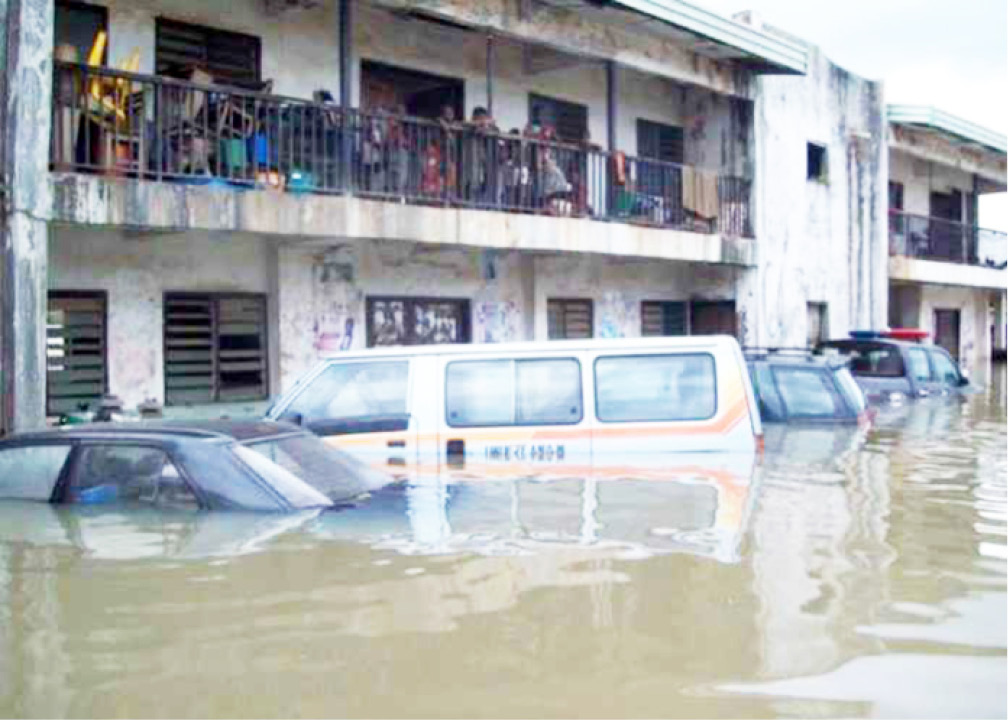Recurrent flooding has prompted the Chairperson of the Association of Women Town Planners, Federal Capital Territory (FCT) chapter, Mrs, Lami Ayuba, to urge development control authorities in the territory and all the states of the federation to ensure strict adherence to town planning rules and regulations in order to build sustainable and habitable cities and towns.
Mrs Ayuba who is also the first vice chairperson of the FCT chapter of the Nigerian Institute of Town Planning (NITP), said it was necessary to carry out hydrological survey data and slope analysis during layout design.
She said building approval authorities were most times not conscious of flooding as an issue, stressing that before approval was given for any building design, consideration should be given to flooding in order to save lives and property.
Reacting to the recent Trademore Estate flooding in Lugbe, Abuja, which killed at least four people and destroyed property worth millions of naira, she suggested that the flooding must have been caused by non-adherence to physical planning standards.
She said, “Are we even conscious, at the point of approval and construction, of flooding as an issue? For now, I have not seen much consciousness about flooding at the point of giving approval.
“Building plans, so far, are drawn based on density provisions, whether this place is a low density or high density. Then the necessary utilities and facilities, like schools, hospitals, a playground and a police station are mapped out in layouts. But I have not seen where a hydrological survey data is prerequisite for building approvals to be granted to estate developers.”
Mrs Ayuba further said it was not enough to do Environmental Impact Assessment (EIA) when constructing an estate or erecting any physical structure.
She explained that, “I know that an EIA is required, a soil test is required, a site analysis report is required, and all that stuff, but I’ve not seen seriousness in addressing hydrological survey, slope analysis and then the topographic survey. Mostly, they (development control) are not really taking it seriously.
“Then a hydrographic analysis is also supposed to be done for an area to find out what are the natural water courses. A river will be dry for the next 30 years, but when the intensity of rainfall happens at a short time, you find that the river finds its way back to that water course, and then it affects every building along its path. It has happened in many places; every building in that water way will be consumed.
“So, hydrographic analysis has to be made so that at least you know that this is a natural water course, and we should take that into consideration when planning the city.”
Mrs Ayuba also blamed quackery in the real estate development profession, saying developers sometimes did not implement the right approved plans during construction.
She said in attempts to cut cost, the right professionals were not used to implement building plans.
She explained that, “They now bring all kinds of quacks who will now cut corners and do all kinds of things. You see building collapsing, susceptibility to flooding and all that stuff.”
She further said there was poor monitoring and enforcement of approved plans by development control authorities, and therefore urged them to ensure strict adherence to approved standards.
Also reacting, the president of the Real Estate Developers Association of Nigeria (REDAN), Dr Aliyu Wammako, commiserated with the families of those who lost their loved ones in the Trademore flooding and urged developers to always adhere to approved standards when constructing.
Dr Wammako said, “I equally want to call on the FCT Administration (FCTA) to understand that this has been happening since 2011 and that it is the responsibility of government to provide necessary infrastructure which includes creation of water channels. It has been happening in Lokogoma and it has been happening in Lugbe, so there is need for government to identify the sources of water and provide canals that will give it free passage.
“In the case of Trademore, they did not build on waterways as mostly insinuated.”
Meanwhile, the acting Executive Secretary of the Federal Capital Development Authority (FCDA), Hajiya Zaliha’u Ahmed, said professional bodies or individuals who might have compromised standards during the construction of the estate would be sanctioned through their respective regulatory bodies.
In a statement signed by the Head of Public Relations of FCDA, Mr Richard Nduul, Hajiya Zaliha’u, herself a town planner, made this known when she received the president of the Nigerian Institute of Town Planners (NITP), Tpl Olutoyin Ayinde, and the President of Town Planners Registration Council of Nigeria (TOPREC), Tpl Ishaku Muktar Kura, on a courtesy visit in Abuja last Thursday.
She said, “I assure you, I will make everything possible to investigate, and both TOPREC and NITP and all other professional bodies will get the report. I assure you that any professional involved, not only the planners, even other professionals, I will make sure that their regulatory bodies are given the report so that we will forestall flooding and save lives and property moving forward.”
The statement indicated that the acting executive secretary with a team of FCTA officials visited both River Plate and Trademore estates to assess the impact of the floods and the likely causes in order to proffer lasting solutions.
The statement further reads in part: “While preliminary findings point to the fact that the flooding in the estate was as a result of the conscription of river courses, as well as not obtaining relevant approvals by the developers, a detailed report is being compiled to be sent to the FCT minister.”

 Join Daily Trust WhatsApp Community For Quick Access To News and Happenings Around You.
Join Daily Trust WhatsApp Community For Quick Access To News and Happenings Around You.


